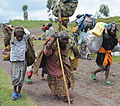What if your home was no longer yours? What if you were a guest in a place you once called your own?
As I prepared for a fact-finding trip to Colombia in May 2010, I tried to do my homework. I looked up demographic and country data, information on the people I was meeting with and definitely the hotspots for off-hours relaxation and fun. However, I was inevitably drawn to the country’s narco-trafficking history and current situation with the guerillas and feuding paramilitary factions. As I read numerous articles and reports, I found out about a group of people whose story is kept hidden and hardly spoken about in the international media.
In my previous posts, I’ve described the plight of refugees, the struggle of foreign-born victims of trafficking, the realities of child soldiers around the globe. There is one group that has remained invisible; that are an unwanted population whose situation, I feel, needs to be highlighted. This is of the world’s 24.5 million people who have been internally displaced.
There is no legal definition to define who fits under this category, but an internally displaced person, or IDP, is generally defined as an individual who have been forced to leave their home. This is in part due to armed conflict, violence, human rights violations or natural disasters. The difference between them and groups such as refugees is that they remain within their home country’s borders. Many lose their home, others lose their land and many have to migrate to areas unknown looking to start anew.
leave their home. This is in part due to armed conflict, violence, human rights violations or natural disasters. The difference between them and groups such as refugees is that they remain within their home country’s borders. Many lose their home, others lose their land and many have to migrate to areas unknown looking to start anew.
The sad truth is that no one wants them; not their home country and not the neighboring nations, and unlike other groups who experience conflict, there are no protections for them or international group assigned to give them aid. International law says that each country is responsible for its citizens. But what do people do when their own country is involved in the conflict that has caused their displacement?
My goal today is to raise awareness. There are 52 countries with IDPs within their boundaries. These include Cyprus, Ethiopia, Israel, Afghanistan, and Iraq. In the last two examples, IDPs continue to live among this chaos as the United States fights with insurgents in those regions to try to restore peace.
Organizations like IDP Voices raise awareness by collecting stories of individuals who collectively tell the tale of their country and the violence lived daily. Here is one snippet:
“Inga is 38 years old. She is Abkhazian and her husband is Georgian. There are four children in the family. Fifteen years have passed since the family went into exile; they lived in Ochamchire district in Abkhazia before the war. Inga talks about the difficulties and hardship experienced during the period of armed conflict, how hard it was even to get bread to eat and the problems of equipping a new place. She speaks of the sadness of losing her home and leaving behind her elderly parents, whom she sees very seldom. She describes the everyday problems of a large family, the constant search for work, shortage of money and the fear of being made homeless”.
Others include Ismael Maestre, a peasant farmer in his mid-40s, who has been displaced three times. Let us hear their voices, let us not forget. While situations above seem far away from our daily reality, internal displacement has occurred in the United States. In 2005, after the wake of Hurricane Katrina, over a million people were displaced from their homes. We were lucky because our government and communities responded, but imagine the devastation that occurred. Now imagine if the people of New Orleans and the Gulf states had to fend for themselves. That’s what an internally displaced person lives through, some for years, others for a lifetime.
Regina Bernadin is a doctoral student at Nova Southeastern University focusing on Conflict Analysis and Resolution. As a SISGI intern, her primary areas of interest are conflict resolution, human rights and Latin American political, economic and socio-cultural issues. Her interest in the development of human rights abroad has taken her to several Latin American countries, including Colombia, Ecuador and Suriname.

